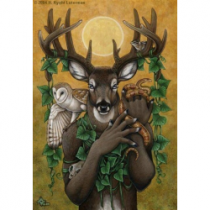
There's a conventional usage in the First Nations press which I think, for various reasons, would be a good fit for the pagan community as well.
There it's customary to identify someone both by name and by tribal affiliation:
Winona la Duke (Anishinabe)
Arvol Looking Horse (Dakota)
This makes perfect sense. In traditional societies, you don't just need to know who someone is; you need to know who her people are as well. In traditional Dine (Navajo) culture, when introducing yourself to a fellow Dine, you mention not just your own name, but your maternal and paternal clans as well. This gives you not just an identity, but a context.
Since pagans come in different kinds, it seems to me that this makes sense for us, too:
Isaac Bonewits (Druid)
Alison Harlow (Feri)





















